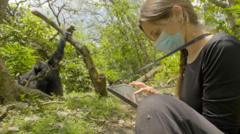In the lush forests of southwest Virginia, innovative farmers are redefining the future of herbal remedies, rooted deeply in Appalachian culture. Ryan Huish, a biology professor at the University of Virginia’s College at Wise, actively nurtures a flourishing garden of medicinal plants on his family’s expansive property. Instructing students on the various edible flora, he emphasizes the significance of these plants, which have historically provided food and medicine for the community.
With a legacy that spans over 300 years, the trade of forest botanicals has long been a cherished tradition in the Appalachian region. However, recent times have seen this market struggle with issues such as low pricing and unsustainable harvesting practices. Katie Commender, who leads the agroforestry program at the nonprofit Appalachian Harvest Herb Hub, expresses concern about the fading knowledge and traditions surrounding this practice, underscoring the importance of passing it on to future generations.
The initiative is part of a broader series titled "50 States, 50 Fixes," aimed at highlighting local solutions to pressing environmental challenges. By coupling tradition with sustainable practices, the movement seeks to ensure that the rich herbal heritage of Appalachia not only survives but thrives in the years to come.
With a legacy that spans over 300 years, the trade of forest botanicals has long been a cherished tradition in the Appalachian region. However, recent times have seen this market struggle with issues such as low pricing and unsustainable harvesting practices. Katie Commender, who leads the agroforestry program at the nonprofit Appalachian Harvest Herb Hub, expresses concern about the fading knowledge and traditions surrounding this practice, underscoring the importance of passing it on to future generations.
The initiative is part of a broader series titled "50 States, 50 Fixes," aimed at highlighting local solutions to pressing environmental challenges. By coupling tradition with sustainable practices, the movement seeks to ensure that the rich herbal heritage of Appalachia not only survives but thrives in the years to come.





















